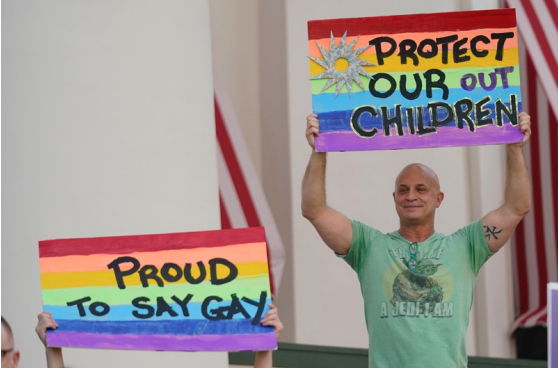Florida Education Bill incites controversy at Saint A’s and national stage

Courtesy/Atlanta Journal Constitution
A protester in Florida showing displeasure toward Don’t Say Gay bill
April 2, 2022
Florida’s Parental Rights in Education Bill has been passed by the state legislature and is heading to the desk of Governor Ron DeSantis (R). This bill prohibits Florida public schools from discussing sexual orientation or gender identity in Kindergarten through third grade. The “Don’t Say Gay” bill has received heavy criticism on the local and national scale, particularly from LGBTQ students and advocates.
A Republican controlled Florida legislature passed this bill with the intention of giving parents the opportunity to talk with their children on the topics of sexual orientation and gender identity on their own. Florida state Senator Dennis Baxley (R) supported the bill by saying, “I know how important it is to empower parents in this relationship. I want to encourage parents across Florida to own it.” The bill directly prohibits any classroom instruction on gender and sexual orientation up through third grade. In older grades, the bill additionally prohibits discussion “in a manner that is not age appropriate or developmentally appropriate for students in accordance with state standards.”
Across the country, opponents of the bill have assigned it the name “Don’t Say Gay”. President Biden referred to the bill as “hateful” and Secretary of Education Miguel Cardona issued a statement saying, “leaders in Florida are prioritizing hateful bills that hurt some of the students most in need.” Florida Democrats feel that they have failed their parents and their students. State Rep Carlos G. Smith said, “[The bill] sends a terrible message to our youth that there is something wrong with LGBTQ people.” The Florida legislature is heavily controlled by Republicans and the vote in the House and Senate fell along party lines.
Educators across the country are exhibiting their frustrations with the bill and the effect it has on students. Willie Carver, a nationally recognized high school teacher, fears that policies like this are causing students to feel isolated and marginalized by the education system. Carver is the faculty advisor to a club called Open Light, his school’s LGBTQ support organization. He told NBC Florida, “There’s a thirst for advocacy, for others and for themselves. I think the first thing that I’m seeing is a lot of heartache and a lot of fear.”
At Saint Anselm, students and professors are reacting to this bill and what it says about the climate of the LGBTQ community in our country. Sean Thompson (‘22) is a NHIOP Ambassador and President of the True Equality and Dignity Alliance (DETA). According to Thompson, “The purpose of TEDA is to create a safe atmosphere on campus for students who identify as being lesbian, gay, bisexual, transgender, queer, questioning, and allies of said students.” In regard to the bill, Thompson said, “There is this misconception that topics pertaining to the LGBTQIA+ community are inherently sexual and inappropriate… If these themes (heterosexual and cisgender material) are considered appropriate for children to talk about in schools, then why are LGBTQIA+ themes of the same degree considered inappropriate?”
Thompson believes this bill is a product of Governor DeSantis and the Republican Party. He cites the Republican National Committee’s stance on marriage and Republicans’ stance on the nomination of Kentaji Brown Jackson for the Supreme Court, particularly on the topic of recognizing same sex marriages. With DeSantis, Thompson sees this soon-to-be law as a tool to gain media attention. On this topic, Thompson said, “The only reason that Governor DeSantis is pushing for this bill is to give him media attention as he prepares for a potential run for the White House in 2024.” DeSantis has been known to be a firm ally of former President Donald Trump and is a potential 2024 presidential candidate.
Professor Danielle Higgins of the Politics Department sees this bill as a smokescreen for other problems facing public schools. According to Professor Higgins, “Many recent bills and laws allow for—even encourage—the targeting of individual teachers for what they teach in their classes, which just worsens the extremely stressful and difficult situation most of our country’s teachers are in.” When asked if this bill were to be proposed in New Hampshire, Professor Higgins said the following, “Absolutely I would criticize it… These laws—with their language of ‘appropriateness’—limit the visibility of queer history and queer people in one of the most important public spaces.” The bill is expected to be signed into Florida law in the coming weeks and is set to take effect on July 1.


